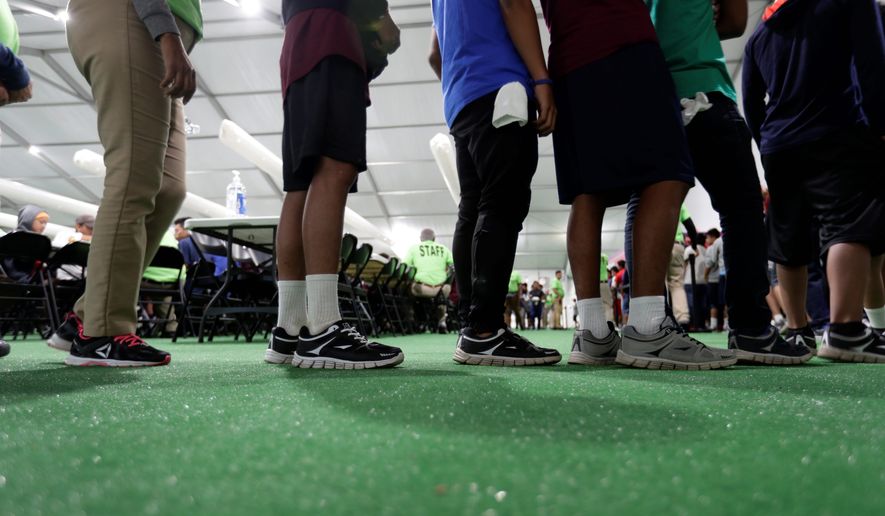Democrats unveiled President Biden’s mass-legalization plan in Congress on Thursday, proposing legal status for perhaps 11 million illegal immigrants already here, fewer penalties on future illegal immigrants, and a major immediate increase in legal immigration.
The plan goes light on border security, with backers arguing illegal immigrants come not because of lax enforcement or easy access to jobs, but because of rough conditions pushing them to leave home. The proposal calls for a major round of nation-building in Latin America to try to stem that “push” factor.
Activists cheered the milestone, which they hoped will ignite the first major congressional debate over a broad immigration legalization since 2013.
But the legislation is already showing signs of trouble, with Thursday’s rollout coming in a virtual press conference that lacked top party leaders. The sponsors are already batting down questions about lack of GOP support dooming the effort.
Analysts said the bill backtracks on key compromises that had made past attempts viable, such as border security or requiring businesses to check new hires against E-Verify, a government program to screen out unauthorized workers.
The Biden plan retreats on both of those issues.
“This is not a bipartisan bill,” a senior administration official acknowledged to reporters in defending the changes.
The bill is being sponsored by Sen. Robert Menendez of New Jersey and Rep. Linda Sanchez of California, both Democrats.
This attempt at a full immigration overhaul follows prior efforts in 2006, 2007 and 2013. In 2006 a broad bill passed the Senate but couldn’t be reconciled with a stiffer enforcement approach taken by the House. In 2007, the bill never cleared the Senate.
In 2013, a bill backed by President Barack Obama made it through a Democrat-controlled Senate but couldn’t gain traction in the GOP-led House.
This time, Democrats have control of both chambers and the White House, and Ms. Sanchez said she feels the stars are aligned.
“We have a president and an administration that is willing to put political muscle behind making sure this gets across the finish line,” she told reporters. “It’s different this time. I feel the excitement, I feel the sense of possibility.”
There are no Republicans on board as of now, and some GOP lawmakers who had been part of past efforts, such as the 2013 bill that cleared the Senate, have already rejected Mr. Biden’s framework.
A number of Republicans labeled the new plan “amnesty” and said it’s unlikely to attract much cooperation.
Some immigrant-rights groups are already eyeing alternatives, such as pulling the bill into pieces and trying to pass some of them.
As it stands, the legislation is 353 pages, and checks off numerous wish-list items of immigrant-rights advocates, from the big to the small.
It would open asylum processing centers in Central America so migrants could apply from home rather than making the trip north, and would eliminate the time limit for applying for asylum from within the U.S.
Those illegal immigrants who do make the journey to the border would find more rescue beacons laid out in case they get lost. And the bill would allow the Justice Department to pay for lawyers for illegal immigrants fighting deportation.
The new legislation takes pains to reject the immigration solutions proposed by former President Donald Trump.
Where he called for ending the diversity lottery that gives away green cards by random chance, the Biden plan increases the number from 55,000 to 80,000.
Mr. Trump’s calls to limit the chain of family migration are also rejected, and instead the Biden proposal increases chances for family migration.
And where Mr. Trump saw the U.S. system as the root cause of illegal immigration, serving as a pull factor to entice people to make the journey, Mr. Biden instead argues the push factors in Latin America are more important.
The crux of the bill is legal status for most of the estimated 11 million illegal immigrants now in the U.S.
Those who made it into the country before Jan. 1, 2021, would be eligible. They would get a five-year provisional status, after which they could receive a green card granting permanent residence, They would be eligible for citizenship three years later.
“Dreamers” and most of those here under Temporary Protected Status would get an even faster path, with immediate green cards. Migrants who could prove they’ve been employed as farm workers would also be eligible for that path.
The bill backtracks on past compromises that even Democrats had accepted, such as workplace enforcement.
The Obama administration supported making E-Verify, currently a voluntary method for screening out illegal immigrants from jobs, mandatory as part of any immigration overhaul.
The Biden bill instead leaves E-Verify a voluntary program, and calls for a commission of business and labor officials to talk about future changes.
• Stephen Dinan can be reached at sdinan@washingtontimes.com.




Please read our comment policy before commenting.